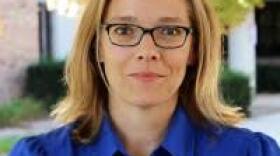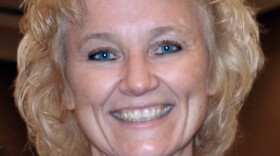The United Way of Washtenaw County (UWWC) has committments for more than 600 thousand dollars in its effort to raise money for non-profits and those in the service sector. This week, it will begin setting priorities on how best allocate that money with a plan to get the money back into the community as quickly as possible. UWWC Vice President of Impact and Advocacy Bridget Healy provided the latest information in her conversation with WEMU's David Fair on this week's installment of "Washtenaw United."
WEMU has partnered with the United Way of Washtenaw County to explore the people, organizations, and institutions creating opportunity and equity in our area. And, as part of this ongoing series, you’ll also hear from the people benefiting and growing from the investments being made in the areas of our community where there are gaps in available services. It is a community voice. It is 'Washtenaw United.'


ABOUT BRIDGET HEALY:
As the Vice President of Impact & Advocacy for United Way of Washtenaw County, she is responsible for establishing, leading, and executing United Way’s community impact agenda of grant making, financial stability programs, public policy advocacy, and community partnerships. Her professional experience in the United Way network spans from coast to coast, having worked at United Ways in Florida, Washington, and now Michigan. She has worked within the public/nonprofit sector for more than a decade and is a native of Miami, FL.
RESOURCES:
UWWC STATEMENT:
In response to the COVID-19 pandemic in Washtenaw County, United Way of Washtenaw County (UWWC) has established the COVID-19 Community Relief Fund to support local human service nonprofits and community groups working with populations impacted by the COVID-19 pandemic.
Fund Purpose: Provide unrestricted operating support to nonprofits and groups meeting immediate, emergent and unanticipated community needs resulting from the COVID-19 pandemic.
Eligibility: Local 501(c)(3) non-profit human service organizations and community collaboratives/groups using a fiscal agent (see Attachment A)
Funding Priorities: In keeping with UWWC’s vision and mission, we will continue to prioritize organizations and groups:
- Whose work benefits people with low incomes, communities of color, and historically and/or systematically marginalized people (Here’s why).
- Whose primary program participants or services are offered in 48197/98 and rural Washtenaw County.
In addition to the above, we are supporting organizations and groups:
- Whose primary program participants are high-risk for contracting COVID-19 (e.g. older adults and those with chronic health conditions).
- Who have experienced a decrease in critical volunteer capacity as a result of the COVID-19 pandemic.
- Who have experienced an increase in staffing demands as a result of responding to the COVID-19 pandemic.
This Fund will be used to meet unmet needs, not duplicate or fund programs that other larger funding programs could cover, or needs that could be met by a federal or state program. Fund to reach organizations and groups that might not have access to resources otherwise will be prioritized.
Equity Commitment: Prioritizing response efforts that attend to racial inequity remains a central tenet in United Way’s grant making. The COVID-19 pandemic continues to reveal the disproportionate impact of this virus on people and communities of color. Experts predict that communities of color will be impacted disproportionately in specific sectors of labor: farmworkers, those living in close quarters, fast-food workers, retail workers, immigrant labor as well as those being held in government facilities (jails, detention centers).
We acknowledge other populations who will disproportionately bear the brunt of the COVID-19 pandemic:
- The elderly and disabled whose daily lives and support systems are disrupted.
- Those without easy access to health care, including rural and Native communities.
- People living in close quarters—whether in public housing, nursing homes, jails, shelters, and people experiencing homelessness.
- LGBTQ people and HIV-positive people.
- People previously employed through the low-wage gig economy, the service industry and non-salaried workers.
Note: This list is not meant to be exhaustive of what equity considerations may look like in the context of coronavirus.
Funding Information: At the time of this publication, UWWC has up to $250,000 available for immediate investment. We will continue to raise money and invest it back into the community as it is received.
Applicants are eligible to apply for funding up to three times between now and September 30, 2020.
Review Process for Grant Submissions: Funds will be awarded on an ongoing basis until further notice and grant awards will be based on competition of requests in relation to fund balance. To expedite funding during Phase I of UWWC relief efforts, submissions submitted by 12pm on Wednesday will be evaluated and a funding decision made on or before the following Friday. Eligible submissions will be identified by staff and then routed for review and approval by a volunteer-led Committee. The Committee may hold onto a proposal for consideration in the future, depending on other proposals received. This Committee is composed of UWWC’s Board Chair, Vice Chair, Finance Committee member, Community Impact Committee member, and the Racial Equity Officer for Washtenaw County.
Non-commercial, fact based reporting is made possible by your financial support. Make your donation to WEMU today to keep your community NPR station thriving.
Like 89.1 WEMU on Facebook and follow us on Twitter
— David Fair is the WEMU News Director and host of Morning Edition on WEMU. You can contact David at 734.487.3363, on twitter @DavidFairWEMU, or email him at dfair@emich.edu






